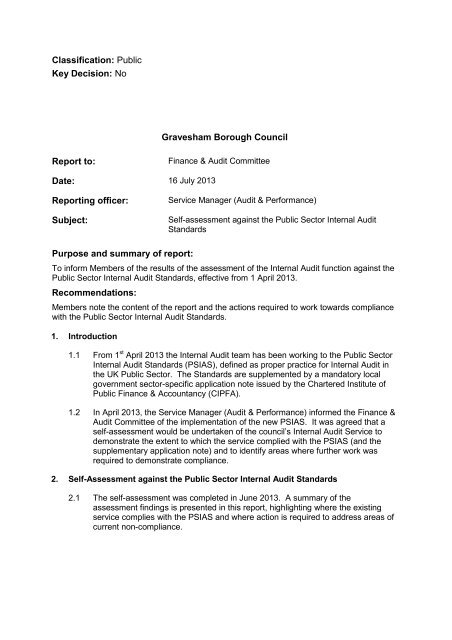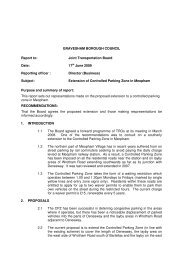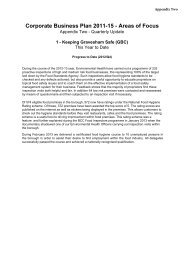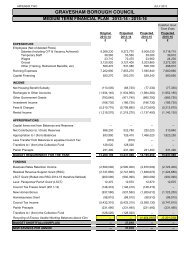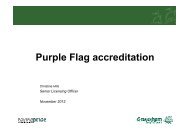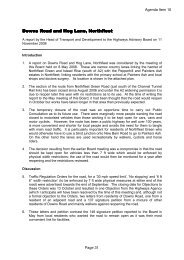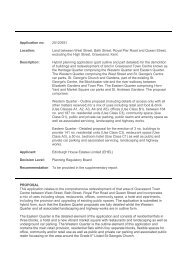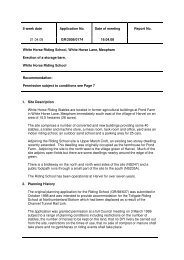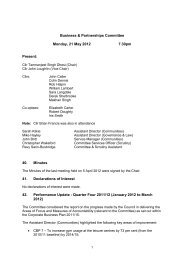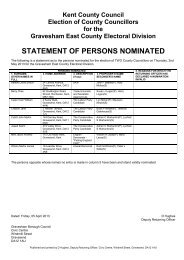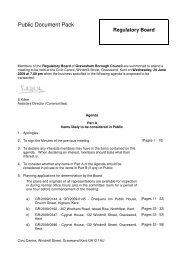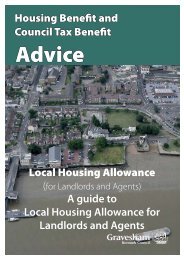Self-assessment against the Public Sector Internal Audit Standards ...
Self-assessment against the Public Sector Internal Audit Standards ...
Self-assessment against the Public Sector Internal Audit Standards ...
Create successful ePaper yourself
Turn your PDF publications into a flip-book with our unique Google optimized e-Paper software.
Classification: <strong>Public</strong><br />
Key Decision: No<br />
Gravesham Borough Council<br />
Report to:<br />
Finance & <strong>Audit</strong> Committee<br />
Date: 16 July 2013<br />
Reporting officer:<br />
Subject:<br />
Service Manager (<strong>Audit</strong> & Performance)<br />
<strong>Self</strong>-<strong>assessment</strong> <strong>against</strong> <strong>the</strong> <strong>Public</strong> <strong>Sector</strong> <strong>Internal</strong> <strong>Audit</strong><br />
<strong>Standards</strong><br />
Purpose and summary of report:<br />
To inform Members of <strong>the</strong> results of <strong>the</strong> <strong>assessment</strong> of <strong>the</strong> <strong>Internal</strong> <strong>Audit</strong> function <strong>against</strong> <strong>the</strong><br />
<strong>Public</strong> <strong>Sector</strong> <strong>Internal</strong> <strong>Audit</strong> <strong>Standards</strong>, effective from 1 April 2013.<br />
Recommendations:<br />
Members note <strong>the</strong> content of <strong>the</strong> report and <strong>the</strong> actions required to work towards compliance<br />
with <strong>the</strong> <strong>Public</strong> <strong>Sector</strong> <strong>Internal</strong> <strong>Audit</strong> <strong>Standards</strong>.<br />
1. Introduction<br />
1.1 From 1 st April 2013 <strong>the</strong> <strong>Internal</strong> <strong>Audit</strong> team has been working to <strong>the</strong> <strong>Public</strong> <strong>Sector</strong><br />
<strong>Internal</strong> <strong>Audit</strong> <strong>Standards</strong> (PSIAS), defined as proper practice for <strong>Internal</strong> <strong>Audit</strong> in<br />
<strong>the</strong> UK <strong>Public</strong> <strong>Sector</strong>. The <strong>Standards</strong> are supplemented by a mandatory local<br />
government sector-specific application note issued by <strong>the</strong> Chartered Institute of<br />
<strong>Public</strong> Finance & Accountancy (CIPFA).<br />
1.2 In April 2013, <strong>the</strong> Service Manager (<strong>Audit</strong> & Performance) informed <strong>the</strong> Finance &<br />
<strong>Audit</strong> Committee of <strong>the</strong> implementation of <strong>the</strong> new PSIAS. It was agreed that a<br />
self-<strong>assessment</strong> would be undertaken of <strong>the</strong> council’s <strong>Internal</strong> <strong>Audit</strong> Service to<br />
demonstrate <strong>the</strong> extent to which <strong>the</strong> service complied with <strong>the</strong> PSIAS (and <strong>the</strong><br />
supplementary application note) and to identify areas where fur<strong>the</strong>r work was<br />
required to demonstrate compliance.<br />
2. <strong>Self</strong>-Assessment <strong>against</strong> <strong>the</strong> <strong>Public</strong> <strong>Sector</strong> <strong>Internal</strong> <strong>Audit</strong> <strong>Standards</strong><br />
2.1 The self-<strong>assessment</strong> was completed in June 2013. A summary of <strong>the</strong><br />
<strong>assessment</strong> findings is presented in this report, highlighting where <strong>the</strong> existing<br />
service complies with <strong>the</strong> PSIAS and where action is required to address areas of<br />
current non-compliance.
2.2 The PSIAS are broken down into two main areas;<br />
• Attribute <strong>Standards</strong> address <strong>the</strong> characteristics of organisations and<br />
parties performing <strong>Internal</strong> <strong>Audit</strong> activities.<br />
• Performance <strong>Standards</strong> describe <strong>the</strong> nature of <strong>Internal</strong> <strong>Audit</strong> activities<br />
and provide quality criteria <strong>against</strong> which <strong>the</strong> performance of <strong>the</strong>se<br />
services can be evaluated.<br />
3. Attribute <strong>Standards</strong><br />
3.1 Standard 1000 - Purpose, Authority and Responsibility<br />
3.2 The <strong>Standards</strong> require <strong>the</strong> purpose, authority and responsibility of <strong>the</strong> <strong>Internal</strong><br />
<strong>Audit</strong> activity to be formally defined in an <strong>Internal</strong> <strong>Audit</strong> charter, consistent with <strong>the</strong><br />
Definition of <strong>Internal</strong> <strong>Audit</strong>ing, <strong>the</strong> Code of Ethics and <strong>the</strong> <strong>Standards</strong>. The chief<br />
audit executive (Head of <strong>Internal</strong> <strong>Audit</strong>) must periodically review <strong>the</strong> <strong>Internal</strong> <strong>Audit</strong><br />
charter and present it to senior management and <strong>the</strong> board (Finance & <strong>Audit</strong><br />
Committee) for approval.<br />
3.3 The existing <strong>Internal</strong> <strong>Audit</strong> Charter sets out <strong>the</strong> purpose, authority and<br />
responsibility of <strong>the</strong> council’s <strong>Internal</strong> <strong>Audit</strong> Service. This will need to be updated<br />
to reflect <strong>the</strong> requirements of <strong>the</strong> PSIAS and will be presented to management<br />
and Members for consideration and approval, in line with <strong>the</strong> terms of reference of<br />
this committee.<br />
3.4 Standard 1100 – Independence and Objectivity<br />
3.5 The <strong>Standards</strong> require <strong>Internal</strong> <strong>Audit</strong> activity to be independent and <strong>Internal</strong><br />
<strong>Audit</strong>ors to be objective in performing <strong>the</strong>ir work.<br />
3.6 The current functional arrangements for <strong>Internal</strong> <strong>Audit</strong> enable <strong>the</strong> Service<br />
Manager (<strong>Audit</strong> & Performance) to report to <strong>the</strong> Council’s Management Team,<br />
Chief Executive and <strong>the</strong> Finance & <strong>Audit</strong> Committee in her own name and report<br />
operationally to a member of <strong>the</strong> corporate management team. Full compliance to<br />
<strong>the</strong> <strong>Standards</strong> will require minor amendment to arrangements for <strong>the</strong> performance<br />
appraisal of <strong>the</strong> Service Manager (<strong>Audit</strong> & Performance) to incorporate feedback<br />
from <strong>the</strong> Chief Executive and <strong>the</strong> Chair of Finance & <strong>Audit</strong> Committee.<br />
3.7 There are arrangements currently in place to ensure <strong>the</strong> integrity of <strong>Internal</strong><br />
<strong>Audit</strong>ors and <strong>the</strong>ir work built into existing audit planning and quality control<br />
processes. The team workload is managed to ensure that individual auditors do<br />
not assess any operations for which <strong>the</strong>y have previously held any responsibility,<br />
been instrumental in process development through consultancy work, or in which<br />
<strong>the</strong>y have any interests.<br />
3.8 Standard 1200 – Proficiency and Due Professional Care<br />
3.9 The <strong>Standards</strong> require that engagements must be performed with proficiency and<br />
due professional care.<br />
3.10 The Service Manager (<strong>Audit</strong> & Performance) is suitably qualified and experienced<br />
and has arrangements in place to ensure <strong>the</strong> team has <strong>the</strong> appropriate<br />
2
competencies, skills, experience and personal attributes as required by <strong>the</strong><br />
<strong>Standards</strong>. The team has existing arrangements in place that to ensure all audit<br />
work is carried out with due professional care including regular one to one and<br />
appraisal meetings, monitoring of performance <strong>against</strong> individual targets and <strong>the</strong><br />
team’s seven performance measures.<br />
3.11 Standard 1300 - Quality Assurance & Improvement Programme<br />
3.12 The <strong>Standards</strong> require <strong>the</strong> chief audit executive to develop and maintain a quality<br />
assurance and improvement programme that covers all aspects of <strong>the</strong> <strong>Internal</strong><br />
<strong>Audit</strong> activity.<br />
3.13 The team has robust quality control arrangements in place currently that ensure a<br />
senior officer reviews all audit work before it is issued to clients. Client satisfaction<br />
with <strong>the</strong> service is monitored through surveys issued following each audit review<br />
and biannually to assess overall performance. The team’s performance is<br />
measured <strong>against</strong> seven performance measures and <strong>the</strong>se are incorporated into<br />
<strong>the</strong> Annual Review of Effectiveness of <strong>Internal</strong> <strong>Audit</strong> reported to Management<br />
Team and <strong>the</strong> Finance & <strong>Audit</strong> Committee for validation. As part of <strong>the</strong> Annual<br />
Review of Effectiveness, <strong>the</strong> team also conducts a self-<strong>assessment</strong> <strong>against</strong><br />
proper practice; for 2013-14 this <strong>assessment</strong> will be <strong>against</strong> <strong>the</strong> PSIAS.<br />
3.14 This section of <strong>the</strong> <strong>Standards</strong> also details specific requirements for an external<br />
<strong>assessment</strong> <strong>against</strong> <strong>the</strong> standards to be carried out at least once every five years;<br />
consideration is currently being given to how this <strong>assessment</strong> can be delivered<br />
and this will be reported to <strong>the</strong> Finance & <strong>Audit</strong> Committee for decision at <strong>the</strong><br />
appropriate time.<br />
4. Performance <strong>Standards</strong><br />
4.1 Standard 2000 – Managing <strong>the</strong> <strong>Audit</strong> Activity<br />
4.2 The <strong>Standards</strong> require <strong>the</strong> chief audit executive to effectively manage <strong>the</strong> <strong>Internal</strong><br />
<strong>Audit</strong> activity to ensure it adds value to <strong>the</strong> organisation.<br />
4.3 Arrangements are currently in place for <strong>the</strong> <strong>Internal</strong> <strong>Audit</strong> activity to be managed<br />
in line with <strong>the</strong> requirements of this Standard. The function is considered to be<br />
achieving its purposes and responsibility as set out in <strong>the</strong> <strong>Internal</strong> <strong>Audit</strong> Charter<br />
and arrangements are in place for preparing a risk based plan that is subject to<br />
approval by <strong>the</strong> Finance & <strong>Audit</strong> Committee. There are policies and procedures in<br />
place to manage <strong>the</strong> audit resource available to deliver <strong>the</strong> plan, and to ensure coordination<br />
of <strong>the</strong> work of <strong>Internal</strong> <strong>Audit</strong> with that of o<strong>the</strong>r assurance providers.<br />
There are existing arrangements in place for <strong>Internal</strong> <strong>Audit</strong> to report to senior<br />
management and <strong>the</strong> Finance & <strong>Audit</strong> Committee.<br />
4.4 To ensure full compliance <strong>the</strong> <strong>Internal</strong> <strong>Audit</strong> Manual will be updated to reflect <strong>the</strong><br />
<strong>Standards</strong> and <strong>Internal</strong> <strong>Audit</strong>ors will be required to sign-up to <strong>the</strong> <strong>Standards</strong> and<br />
Code of Ethics on an annual basis; previously <strong>the</strong> team have signed-up to <strong>the</strong><br />
CIPFA Code of Practice as was required under that regime. In addition <strong>the</strong> format<br />
of <strong>the</strong> Annual <strong>Audit</strong> plan brought to <strong>the</strong> Finance & <strong>Audit</strong> Committee for approval<br />
will be adjusted to reflect <strong>Internal</strong> <strong>Audit</strong>’s place in <strong>the</strong> council’s Risk Management<br />
processes and to show <strong>the</strong> respective priorities of individual pieces of work.<br />
3
4.5 Standard 2100 – Nature of Work<br />
4.6 The <strong>Standards</strong> requires <strong>the</strong> <strong>Internal</strong> <strong>Audit</strong> activity to evaluate and contribute to <strong>the</strong><br />
improvement of governance, risk management and control processes using a<br />
systematic and disciplined approach.<br />
4.7 Existing arrangements are in line with <strong>the</strong> <strong>Standards</strong>; <strong>Internal</strong> <strong>Audit</strong> make<br />
recommendations to improve <strong>the</strong> council’s control environment and action taken<br />
by management to implement recommendations is monitored and reported to<br />
Management Team and <strong>the</strong> Finance & <strong>Audit</strong> Committee. <strong>Internal</strong> <strong>Audit</strong> fulfils a<br />
key role in promoting ethics, values, risk and control awareness and<br />
arrangements within <strong>the</strong> Council through both its planned and responsive<br />
workloads and also through participation in <strong>the</strong> Annual Governance Review<br />
process to prepare <strong>the</strong> council’s Annual Governance Statement.<br />
4.8 Standard 2200 – Engagement Planning<br />
4.9 The <strong>Standards</strong> require <strong>Internal</strong> <strong>Audit</strong>ors to develop and document a plan for each<br />
engagement, including <strong>the</strong> engagement’s objectives, scope, timing and resource<br />
allocations.<br />
4.10 Current engagement planning arrangements are in line with <strong>the</strong> <strong>Standards</strong> for all<br />
control assurance work carried out by <strong>the</strong> team, including preparing and<br />
agreement <strong>Internal</strong> <strong>Audit</strong> Briefs with clients in advance of audit reviews that set<br />
out <strong>the</strong> objectives, scope and resources allocated to <strong>the</strong> specific review.<br />
4.11 To fully comply with <strong>the</strong> <strong>Standards</strong>, <strong>the</strong> template <strong>Internal</strong> <strong>Audit</strong> Brief will be<br />
amended to give more detail of <strong>the</strong> nature of testing specifically identifying,<br />
analysing and evaluating information. It will also be necessary for <strong>the</strong> team to<br />
issue a formal <strong>Internal</strong> <strong>Audit</strong> Brief for all consultancy engagements where<br />
previously this has only been <strong>the</strong> case for significant project work.<br />
4.12 Standard 2300 – Performing <strong>the</strong> Engagement<br />
4.13 The <strong>Standards</strong> require <strong>Internal</strong> <strong>Audit</strong>ors to identify, analyse, evaluate and<br />
document sufficient information to achieve <strong>the</strong> engagement’s objectives.<br />
4.14 Existing arrangements in place to perform <strong>Internal</strong> <strong>Audit</strong> reviews are in line with<br />
<strong>the</strong> <strong>Standards</strong> with individual auditors identifying, analysing, evaluating and<br />
documenting sufficient information to support <strong>the</strong>ir conclusions and<br />
recommendations made to client management.<br />
4.15 Standard 2400 – Communicating Results<br />
4.16 The <strong>Standards</strong> require <strong>Internal</strong> <strong>Audit</strong>ors to communicate <strong>the</strong> results of<br />
engagements.<br />
4.17 Current arrangements to communicate <strong>the</strong> results of <strong>Internal</strong> <strong>Audit</strong> work are<br />
considered to be of a high quality (supported by client feedback) and meet <strong>the</strong><br />
requirements of <strong>the</strong> <strong>Standards</strong>, providing clients with details of work undertaken,<br />
findings and conclusions drawn. Arrangements are in place for reports to be<br />
finalised with agreement of <strong>the</strong> client to recommendations prioritised according to<br />
risk and final reports record responsible officers and timescales for action agreed.<br />
Arrangements are also in place for <strong>the</strong> Service Manager (<strong>Audit</strong> & Performance) to<br />
4
deliver an annual opinion on <strong>the</strong> council’s internal control environment in line with<br />
<strong>the</strong> <strong>Standards</strong>.<br />
4.18 This section of <strong>the</strong> <strong>Standards</strong> also details in what circumstances <strong>Internal</strong> <strong>Audit</strong><br />
teams may declare that <strong>the</strong>ir work has been conducted in conformance with <strong>the</strong><br />
<strong>Standards</strong> and <strong>the</strong> requirement to disclose of any non-compliance if doing so.<br />
<strong>Internal</strong> <strong>Audit</strong> at Gravesham will not give consideration to making this declaration<br />
until <strong>the</strong> actions identified in this report to work towards compliance with <strong>the</strong><br />
PSIAS are taken.<br />
4.19 Standard 2500 – Monitoring Progress<br />
4.20 The <strong>Standards</strong> require <strong>the</strong> chief audit executive to establish and maintain a<br />
system to monitor <strong>the</strong> disposition of results communicated to management.<br />
4.21 <strong>Internal</strong> <strong>Audit</strong> has arrangements in place to monitor and follow up on<br />
recommendations to enhance <strong>the</strong> control environment that are agreed with client<br />
management to ensure weaknesses identified are addressed promptly; <strong>the</strong> results<br />
of this process are regularly reported to Management Team and <strong>the</strong> Finance &<br />
<strong>Audit</strong> Committee.<br />
4.22 Standard 2600 - Communicating <strong>the</strong> Acceptance of Risks<br />
4.23 The <strong>Standards</strong> required that, when <strong>the</strong> chief audit executive concludes that<br />
management has accepted a level of risk that may be unacceptable to <strong>the</strong><br />
organisation, <strong>the</strong> chief audit executive must discuss <strong>the</strong> matter with senior<br />
management. If <strong>the</strong> chief audit executive determines that <strong>the</strong> matter has not been<br />
resolved, <strong>the</strong> chief audit executive must communicate <strong>the</strong> matter to <strong>the</strong> board.<br />
4.24 Client management at Gravesham Borough Council respond positively to <strong>the</strong> work<br />
of <strong>Internal</strong> <strong>Audit</strong> and this situation has not arisen to date; however <strong>the</strong>re are<br />
arrangements in place for such a situation to be reported to Management Team<br />
and <strong>the</strong> Finance & <strong>Audit</strong> Committee should this arise.<br />
5. Next Steps<br />
The <strong>Internal</strong> <strong>Audit</strong> team will work towards compliance with <strong>the</strong> requirements of <strong>the</strong><br />
PSIAS over <strong>the</strong> remainder of <strong>the</strong> financial year.<br />
6. BACKGROUND PAPERS<br />
6.1 Background papers include <strong>the</strong> full self-<strong>assessment</strong> of <strong>the</strong> council’s <strong>Internal</strong> <strong>Audit</strong><br />
service <strong>against</strong> <strong>the</strong> PSIAS and <strong>the</strong> application note issued by CIPFA. Please<br />
contact Committee & Electoral Services should you wish to inspect <strong>the</strong>se papers.<br />
5
IMPLICATIONS APPENDIX 1<br />
Legal<br />
Finance and<br />
Value for<br />
Money<br />
Risk<br />
Assessment<br />
Equality<br />
Impact<br />
Assessment<br />
The Accounts and <strong>Audit</strong> Regulations 2011 require <strong>the</strong> council to “undertake an<br />
adequate and effective <strong>Internal</strong> <strong>Audit</strong> of its accounting records and of its system of<br />
internal control in accordance with <strong>the</strong> proper practices in relation to internal<br />
control.” Proper practice is currently defined as that contained within <strong>the</strong> CIPFA’s<br />
Code of Practice for <strong>Internal</strong> <strong>Audit</strong> in Local Government 2006. From 1 st April 2013,<br />
proper practice will be <strong>the</strong> common set of <strong>Public</strong> <strong>Sector</strong> <strong>Internal</strong> <strong>Audit</strong> <strong>Standards</strong><br />
(PSIAS) for <strong>the</strong> UK <strong>Public</strong> <strong>Sector</strong>.<br />
There are currently no known finance or value for money considerations as a result<br />
of <strong>the</strong> introduction of <strong>the</strong> PSIAS. Potential options for conducting <strong>the</strong> external<br />
<strong>assessment</strong> of <strong>Internal</strong> <strong>Audit</strong> will be considered.<br />
Failure to embrace <strong>the</strong> PSIAS could result in a non-compliant <strong>Internal</strong> <strong>Audit</strong> service.<br />
Screening for Equality Impacts<br />
Question Answer Explanation<br />
a. Does <strong>the</strong> decision<br />
being made or<br />
recommended through<br />
this paper have<br />
potential to cause<br />
adverse impact or<br />
discriminate <strong>against</strong><br />
different groups in <strong>the</strong><br />
community<br />
b. Does <strong>the</strong> decision<br />
being made or<br />
recommended through<br />
this paper make a<br />
positive contribution to<br />
promoting equality<br />
No<br />
No<br />
No Impact<br />
No Impact<br />
c. What steps are you<br />
taking to mitigate,<br />
reduce, avoid or<br />
minimise <strong>the</strong> impacts<br />
identified above<br />
N/A<br />
In submitting this report, <strong>the</strong> Chief Officer doing so is confirming that <strong>the</strong>y have<br />
given due regard to <strong>the</strong> equality impacts of <strong>the</strong> decision being considered, as noted<br />
in <strong>the</strong> table above<br />
6
Corporate<br />
Business<br />
Plan<br />
Crime and<br />
Disorder<br />
The work of <strong>the</strong> <strong>Internal</strong> <strong>Audit</strong> Team supports <strong>the</strong> council in achieving all of its<br />
areas of focus set out in <strong>the</strong> Corporate Business Plan but is particularly relevant to<br />
area of focus 18; working to ensure council services provide value for money and<br />
are delivered effectively.<br />
<strong>Internal</strong> <strong>Audit</strong> provides an independent and objective opinion to <strong>the</strong> organisation on<br />
<strong>the</strong> control environment, by evaluating its effectiveness in achieving <strong>the</strong><br />
organisations’ objectives. The work of <strong>Internal</strong> <strong>Audit</strong> combined with a sound internal<br />
control environment has a positive contribution to community safety in its broadest<br />
sense.


